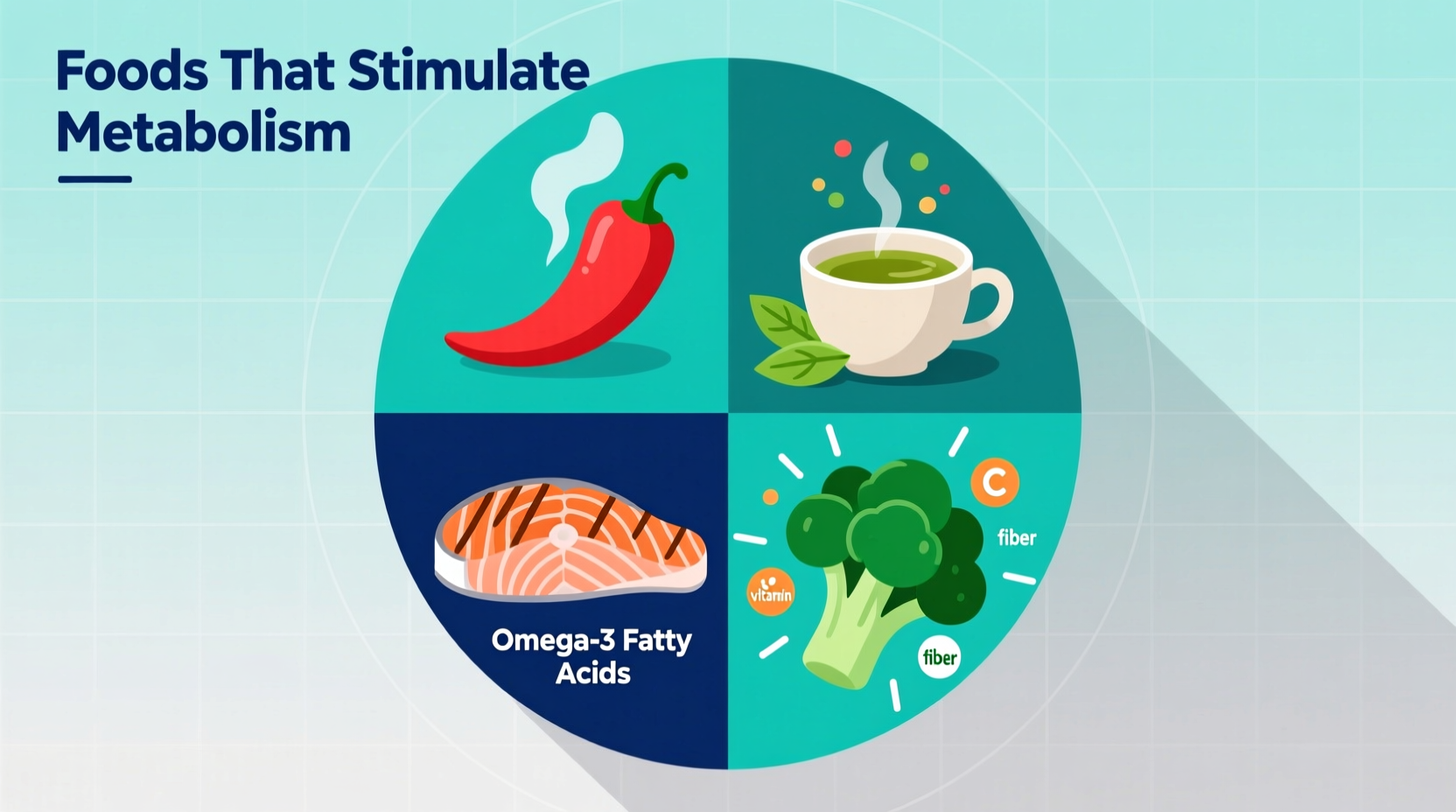Based on current scientific evidence, no foods significantly "boost" metabolism long-term, but certain foods like green tea, chili peppers, protein-rich foods, and coffee may cause small, temporary increases in metabolic rate through thermogenesis. The effect is modest—typically 4-5% increase—and should be viewed as complementary to overall healthy eating and physical activity, not a standalone weight loss solution.
Many people search for metabolism-boosting foods hoping for a quick fix to weight management. While the reality is less dramatic than marketing claims suggest, certain foods do have measurable, though modest, effects on metabolic processes. Understanding these effects requires separating scientific fact from popular myths.
Understanding Metabolism: Setting Realistic Expectations
Your metabolism—the complex biochemical process that converts food into energy—is influenced by multiple factors including age, muscle mass, genetics, and overall health. While food choices play a role, they represent just one piece of the metabolic puzzle.
"The idea of 'boosting' metabolism through specific foods is often overstated," explains Antonio Rodriguez, culinary science expert. "What we're really discussing are thermogenic foods that cause a slight, temporary increase in calorie burning during digestion. This effect is measurable but small—nowhere near enough to compensate for poor dietary habits."
Science-Backed Foods with Metabolic Effects
Research shows these foods may support metabolic function through various mechanisms:
Protein-Rich Foods
Foods high in protein require more energy to digest—a phenomenon called the thermic effect of food (TEF). Studies show protein can increase metabolic rate by 15-30%, compared to 5-10% for carbohydrates and 0-3% for fats.
- Eggs: Complete protein source with essential amino acids
- Lean meats: Chicken, turkey, and lean beef provide high-quality protein
- Fish: Salmon and tuna offer protein plus metabolism-supporting omega-3s
- Legumes: Beans and lentils provide plant-based protein and fiber
Green Tea and Catechins
Green tea contains epigallocatechin gallate (EGCG), which may increase fat oxidation and metabolic rate. A meta-analysis published in the American Journal of Clinical Nutrition found green tea extract could increase energy expenditure by about 4%.

Chili Peppers and Capsaicin
Capsaicin, the compound that gives chili peppers their heat, may temporarily increase metabolic rate. Research from the National Institutes of Health indicates capsaicin could increase energy expenditure by approximately 50 calories per day—equivalent to a small apple.
Coffee and Caffeine
Caffeine stimulates the nervous system, signaling fat cells to break down fat. A study in the International Journal of Obesity found caffeine increased metabolic rate by 3-11%, with larger effects in lean individuals.
Evidence-Based Comparison of Metabolic Effects
| Food/Compound | Mechanism | Metabolic Increase | Duration of Effect |
|---|---|---|---|
| Protein | Thermic effect of food (TEF) | 15-30% of calories consumed | 2-3 hours after eating |
| Green tea (EGCG) | Inhibits catechol-O-methyltransferase | ~4% increase in energy expenditure | Several hours |
| Capsaicin | Activates TRPV1 receptors | ~50 calories/day | 30-60 minutes |
| Caffeine | Stimulates nervous system | 3-11% increase | 3-4 hours |
Context Matters: When Metabolic Effects Apply
The impact of these foods varies significantly based on individual factors:
- Individual metabolism: Effects are generally more pronounced in lean individuals than those with higher body fat
- Habituation: Regular consumers of caffeine or capsaicin may experience diminished effects over time
- Overall diet: These foods work best as part of balanced nutrition, not in isolation
- Physical activity level: Effects are amplified when combined with regular exercise
Evolution of Metabolic Research: A Timeline
Our understanding of food's impact on metabolism has evolved significantly:
- 1980s: Early research identified the thermic effect of different macronutrients
- 1990s: Studies on capsaicin's metabolic effects began appearing in scientific literature
- Early 2000s: Green tea research expanded beyond traditional Asian medicine into Western science
- 2010s: More sophisticated studies distinguished between acute metabolic effects and long-term weight management
- 2020s: Current research focuses on personalized nutrition approaches based on individual metabolic responses
Practical Implementation: Making It Work for You
Instead of searching for metabolic magic bullets, consider these evidence-based strategies:
- Include protein at every meal: Aim for 20-30 grams per meal to maximize the thermic effect
- Add spice strategically: Incorporate chili peppers into dishes 2-3 times weekly for potential benefits
- Time your green tea: Drink between meals to avoid interference with iron absorption
- Don't overdo caffeine: Limit to 200-400mg daily (2-4 cups of coffee) to avoid tolerance buildup
- Combine with strength training: Building muscle mass has a more significant long-term metabolic impact than any food
Common Misconceptions About Metabolism-Boosting Foods
Understanding what these foods don't do is as important as knowing their benefits:
- No food causes significant weight loss on its own: The metabolic effects are too small to overcome poor dietary habits
- "Metabolism-boosting" supplements often overpromise: Many contain the same compounds found in whole foods, but at doses that may cause side effects
- Effects aren't cumulative: Eating multiple "metabolism-boosting" foods together doesn't multiply the effect
- Genetics play a larger role: Your baseline metabolic rate is largely determined by factors beyond food choices
The Bigger Picture: Sustainable Metabolic Health
For meaningful, lasting metabolic improvements, focus on these evidence-backed approaches:
- Maintain muscle mass through regular strength training
- Get adequate quality sleep (7-9 hours nightly)
- Manage stress levels through mindfulness or other techniques
- Stay consistently hydrated throughout the day
- Eat a varied, whole-foods-based diet rather than focusing on single "superfoods"
"The most effective approach to metabolic health combines multiple lifestyle factors," Rodriguez emphasizes. "Think of metabolism-supporting foods as helpful supporting players, not the main event in your health strategy."











 浙公网安备
33010002000092号
浙公网安备
33010002000092号 浙B2-20120091-4
浙B2-20120091-4